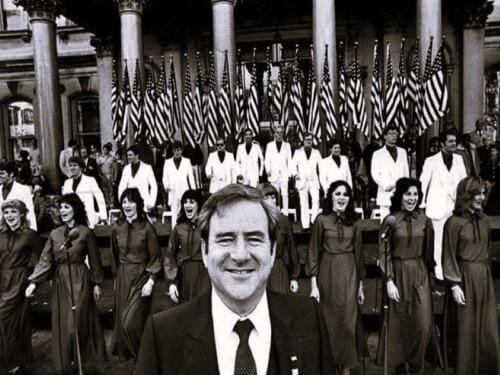
Editor’s Note: The following first appeared in Dr. Jemar Tisby’s , including that of Coretta Scott King.
“We decided to submit to arrest today to call attention to the urgent need to pass federal legislation which would establish economic sanctions against the apartheid government of South Africa,” said King, widow of slain civil rights leader Dr. Martin Luther King Jr., reading from a prepared statement.
The mounting pressure made a bill to enforce sanctions against the South African government a top issue in 1985.
In this context, Jerry Falwell, the fundamentalist Baptist preacher and founder of the Moral Majority organization, visited South Africa on a “fact-finding” mission to:
- Bring an expeditious end to apartheid
- Provide humanitarian and spiritual help to the suffering blacks, coloreds, and Indians of South Africa…and,
- Prevent the fall of South Africa into the Soviet Orbit
Falwell articulated these priorities after his visit to South Africa to clear up the controversy he caused for himself.
Of the three reasons he listed, the last one about South Africa falling into the Soviet orbit was perhaps the most honest.
Anticommunism was still running strong in the United States, especially in white fundamentalist and evangelical circles. Reagan had dubbed the Soviet Union the “evil empire” in 1983, and many Christians interpreted geopolitics as a cosmic struggle between God and the devil.
Many conservative politicians and Christians prioritized support for the South African government as a way to ward off the spread of Communism over the human and civil rights abuses occurring under apartheid.
Falwell spoke to several leaders in South Africa during his five-day visit to gauge their opinions on U.S. sanctions of the country.
When Falwell returned from his visit to South Africa, he said, ‘“If Bishop Tutu maintains that he speaks for the black people of South Africa, he’s a phony.”
Falwell maintained that Tutu, who had recently won a Nobel Peace Prize, did not represent the majority opinion of South Africans.
“There are millions of Americans who do not agree with … what Bishop Tutu has been saying. The South African government is making progress,” Falwell insisted.
Not only did Falwell denounce Tutu, he called for increased investments in South Africa.
He urged Americans to support the Pretoria Government by buying its one-ounce gold coins, called Krugerrands, and by investing in companies that do business there.
Falwell was many things, but he was not stupid. He couched his compromises on racism in pro-Black terms. He insisted that economic sanctions would hurt Black South Africans most of all. He argued that working with the white apartheid government was the quickest way to get it to change its racist policies. He also spoke to several Black leaders in South Africa to lend credence to his views.
He used the fact that no racial or ethnic group ever displays complete unanimity on an issue to intimate that Black South Africans opposed economic pressure to get the government to change.
It’s an old tactic—use a fringe opinion found within an oppressed group and broadcast it as if it is more legitimate and popular than it is. And make sure you get members of that oppressed group to back you up so you can deflect accusations of racism and bigotry.
But people saw through Falwell’s tactics.

Anti-apartheid protesters at Columbia University. Photo Credit: Columbia School of General Studies via Zinn Ed.
Bishop Tutu had put his life on the line to oppose apartheid and speak truth to power about racism. He was a much-respected figure worldwide, and Falwell’s comments elicited sharp criticism from even some conservative circles.
Richard Sincere, a conservative nonprofit leader who opposed sanctions, said of Falwell’s remarks, “’I think Jerry Falwell was acting without real knowledge, or with only a very superficial knowledge, of what’s going on in South Africa. He did not talk to as wide a range of people as he could have.”
Bishop Tutu’s daughter, Naomi Tutu-Seavers, who was living in the United States at the time, said that Falwell was “’consciously distorting my country’s political reality.”
In response, Falwell mildly walked back his comments but remained supportive of the South African regime.
“It was an unfortunate choice of words. The word phony I should not have used. I should have used the word that he was incorrect or wrong, and I have since apologized,” Falwell said.
Asked what he would say to Tutu if he had the chance, Falwell said: “I’m saying that if the word phony to you, as communicated to you, meant that I was impugning you as a person or minister, I apologize. I was impugning the fact that you, sir, do not speak for the South Africans any more than I speak for all Americans.”
Falwell’s denigrating remarks about Bishop Desmond Tutu demonstrate the ways anti-Communist sentiments overshadowed concerns for protecting human rights.
For Falwell and other conservative Christians, containing Communism became an all-important pursuit that took precedence over calling for an end to racist systems.
And not just in South Africa.
In the United States, efforts to fight racism have often been labeled as “Communist.” Simply slap the “c-word” on a movement, and you can dismiss it, denigrate it, and dismantle it with violent force.
Falwell had the audacity and arrogance to call a Black civil rights leader respected around the world a phony. Falwell had let his certainty about politics and Christianity lead him deeper into ignorance and arrogance.
The legal South African apartheid regime did eventually fall in 1994, no thanks to people like Falwell. The changes came about partially through the pressure of sanctions that Congress eventually approved, but mostly through the resilience and hope of Black South Africans.
Jerry Falwell calling Desmond Tutu a “phony” was a bold example of the way white Christians demonstrated compromise and complicity with racism instead of courageously confronting it.


